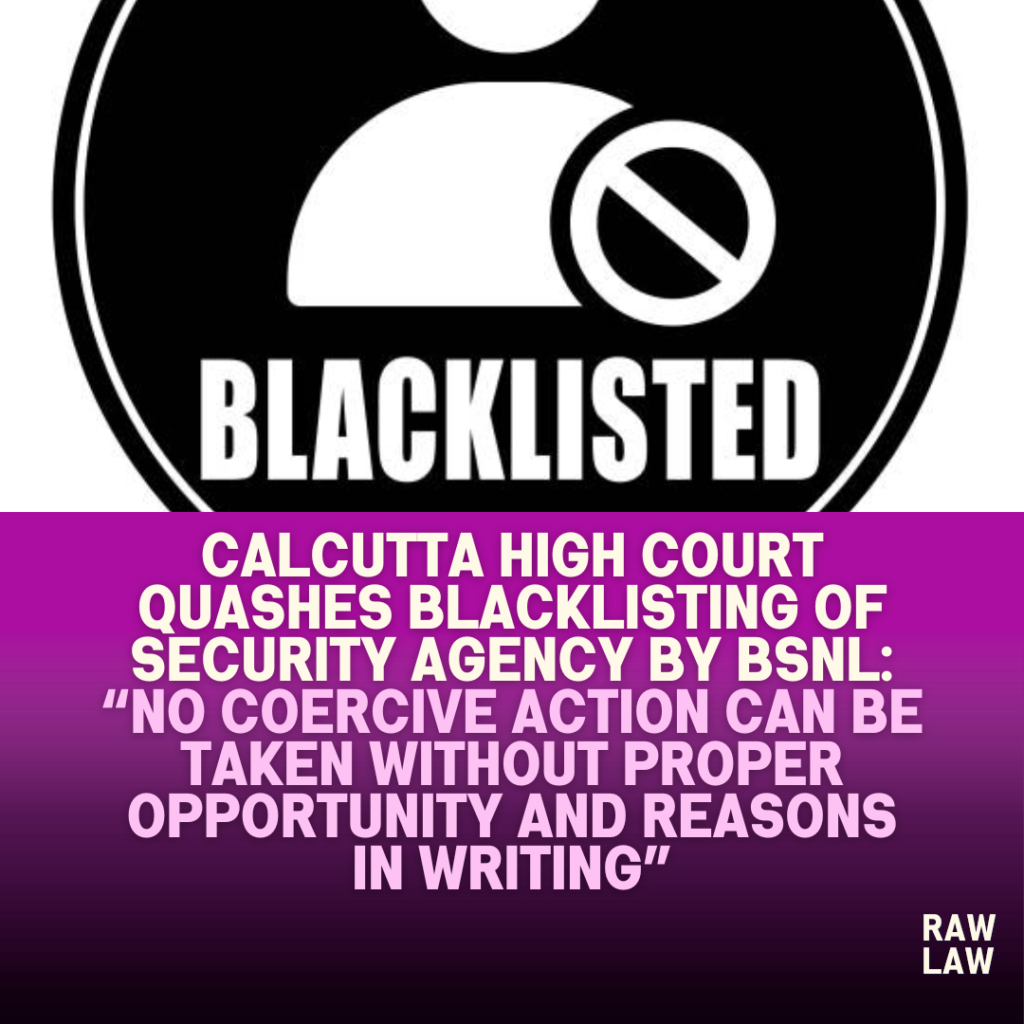Court’s Decision
In National Security Services v. Bharat Sanchar Nigam Limited, the Calcutta High Court allowed the writ petition and quashed the order issued by BSNL blacklisting the petitioner security agency from participating in future tenders. The Court held that the impugned blacklisting order violated principles of natural justice as it was passed without issuing a show-cause notice, furnishing grounds, or granting personal hearing. The action was found to be arbitrary and in breach of applicable guidelines and contractual terms.
Facts
The petitioner, a private security service agency, had been awarded a contract for deploying security personnel at various BSNL offices. After completion of the contract, a communication was issued by BSNL on 04.11.2021, declaring the petitioner “blacklisted from participation in any future BSNL tender” citing alleged violation of contractual obligations.
The petitioner challenged the order, stating that no show-cause notice was served, no reasons were supplied, and no opportunity of hearing was granted. The petitioner also contended that the blacklisting adversely affected its right to carry on business and its future prospects.
Issues
- Whether the impugned blacklisting order was passed in violation of the principles of natural justice?
- Whether BSNL was justified in taking coercive action without serving any prior show-cause notice or granting a personal hearing?
- Whether the procedure adopted by BSNL was in consonance with Department of Telecommunications (DoT) guidelines and tender terms?
Petitioner’s Arguments
The petitioner submitted:
- The impugned order was passed arbitrarily, without any prior notice or personal hearing.
- The blacklisting order adversely affected the petitioner’s reputation and business prospects, engaging Article 19(1)(g) of the Constitution.
- As per settled legal principles, blacklisting amounts to civil death for a business entity and cannot be undertaken without adherence to fair procedure.
- The action also violated DoT guidelines that require issuance of a notice and hearing before such penal actions are taken.
- No breach of contract was proved, nor was there any determination of loss or default attributable to the petitioner.
Respondent’s Arguments
BSNL argued:
- The petitioner had violated the terms of the contract and was therefore not entitled to participate in future tenders.
- The action of blacklisting was administrative in nature and within its rights as a principal employer.
- Though no formal notice was served, the petitioner was aware of the deficiencies during execution of the contract.
- The internal records sufficed for the decision and did not require external communication.
Analysis of the Law
The Court reiterated that blacklisting has grave consequences for a contractor and must be preceded by a fair and transparent process.
- Article 14 guarantees fairness in administrative actions.
- Article 19(1)(g) protects the right to practice any profession or carry on any occupation, trade, or business, which cannot be curtailed arbitrarily.
- The Court observed that the mere perception of misconduct does not justify blacklisting unless the affected party is heard and reasons are recorded.
The Court also examined the relevant DoT Guidelines on Debarment and Blacklisting, which require:
- Notice to show cause.
- Disclosure of specific charges.
- Adequate opportunity to reply.
- Consideration of the reply.
- Speaking order with reasons.
None of these steps were followed by BSNL.
Precedent Analysis
The Court relied on the following landmark cases:
- Erusian Equipment & Chemicals Ltd. v. State of West Bengal, (1975) 1 SCC 70
➤ Held that blacklisting affects fundamental rights and requires compliance with principles of natural justice. - Kulja Industries Ltd. v. Chief General Manager, W.T. Project BSNL, (2014) 14 SCC 731
➤ Reaffirmed that blacklisting cannot be done arbitrarily without giving a reasonable opportunity to be heard. - Raghunath Thakur v. State of Bihar, (1989) 1 SCC 229
➤ Blacklisting without hearing the party was found to be unconstitutional.
These decisions were cited to underscore that even in contractual or administrative matters, natural justice must be followed when the decision has serious consequences.
Court’s Reasoning
Justice Amrita Sinha held:
“The authority cannot take any coercive action without recording reasons in writing and without affording a reasonable opportunity of hearing to the affected party.”
The Court noted that:
- No show-cause notice or personal hearing was granted.
- The blacklisting was not preceded by any speaking order or determination of fault.
- The BSNL did not follow the DoT’s own procedural safeguards.
- The order had the effect of depriving the petitioner of future business without justification.
The High Court declared the impugned blacklisting order to be non-est in law.
Conclusion
- The writ petition was allowed.
- The impugned blacklisting order was quashed and set aside.
- The Court declared that BSNL could not restrain the petitioner from participating in future tenders based on the impugned order.
Implications
This judgment:
- Strengthens the mandate of natural justice in administrative blacklisting.
- Clarifies that procedural compliance is mandatory even for PSUs like BSNL.
- Reinforces judicial scrutiny over quasi-judicial and administrative decisions affecting fundamental rights.
- Sets a precedent for aggrieved contractors facing blacklisting without notice.
Summary of Cases Referred
- Erusian Equipment v. State of West Bengal, (1975) 1 SCC 70: Natural justice is mandatory before blacklisting.
- Kulja Industries Ltd. v. BSNL, (2014) 14 SCC 731: Administrative fairness is essential even in contractual settings.
- Raghunath Thakur v. State of Bihar, (1989) 1 SCC 229: Denial of hearing before blacklisting violates constitutional principles.



